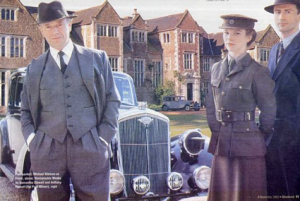
by jphilo | Feb 24, 2009 | Reviews

Last week, I checked out the first episode of Masterpiece Theater’s Foyle’s War. Ten minutes into the show, I was hooked, determined to watch every episode. I returned the first episode to the library yesterday and checked out the next three.
The woman at the circulation desk waved the DVD case in the air. “Aren’t these wonderful? We’re in the middle of season three.” Then she laughed. “Anybody who checks out one of these ends up watching the whole series.”
Last night I watched the second episode, entranced. What makes the series so good? Is it Michael Kitchen as Detective Chief Superintendent Christopher Foyle? His characterization of the detective who’s request to enlist during WWII has been denied is masterful, understated, poignant. The writers weave war news with Foyle’s work in war-weary England subtly and beautifully. They slowly build the life stories of the supporting actors into their relationship with Foyle in a way that brings me back for more. And the meticulous period costuming and the beautiful English countryside are a feast for the eyes.
If you like English mysteries, World War II and well-written, well-acted entertainment, this series is for you. Check this link for more information about the series and the order of the episodes. You’ll want to watch them in order to see the characters grow and change. Happy watching, and tell me what you think of Foyle’s War.
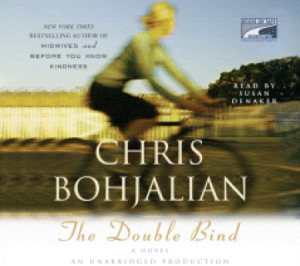
by jphilo | Jan 26, 2009 | Reviews

On January 19, our book club met to discuss The Double Bind, a complex and thought-provoking novel by Chris Bohjalian. The author skillfully weaves the story of a young woman who survives an attempted rape, a homeless man who was once a gifted photographer, and F. Scott Fitzgerald’s The Great Gatsby. Bohjalian’s the master of trick endings, and once again, he doesn’t disappoint. We had a long and lively discussion about the book, and though we didn’t come up with many answers, our brains had a good work out that night.
What interested me most about the story was the part post-traumatic stress disorder (PTSD) played in the story. Was it a coincidence that our first book club pick after Allen’s treatment for PTSD dealt with the subject? I didn’t think so, especially since I don’t believe in coincidence.
This past weekend I finished listening to the audiobook version of Nineteen Minutes. The main character in Jodi Picoult’s novel is a boy who endured bullying throughout his school career and goes on a Columbine-style shooting spree when he’s a junior. Again, the author devoted significant time to explaining how PTSD effected the main character’s life.
Though works of fiction, these two books caused me to reflect on Allen’s recent treatment for PTSD. I am so grateful for the gifted therapists who helped him recover, for his determination to stick with it, for the support of family and friends throughout the adventure. Most of all I am humbled by the protection, healing, and resolution God provided for our son. Not every family receives those gifts. Some stories end in heartbreaking tragedy and loss. Why not us? I wonder. How will God use this experience in the future?
I can’t answer that question. But, if the next book I read or listen to provides the answer, I’m buying a bookstore.
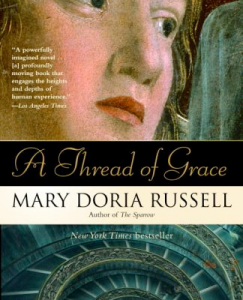
by jphilo | Jan 15, 2009 | Reviews

A Thread of Grace is one of the saddest and most hopeful books I have read in a long time. It’s a well-researched historical novel set in Italy during World War II. Mary Doria Russell chronicles the efforts of northern Italy’s village priests and peasants to hide Jews from the Nazis.
The risks taken and sacrifices made by ordinary people make for sobering and sometimes harrowing reading. The inhumanity and arrogance of the oppressors is horrifying, yet the efforts of those protecting the Jews weaves a thread of grace around the cruelty. Where did those ordinary people find strength to do good deeds in the face of such evil? Only by clinging to the thread of grace, the actions of the priest and peasants seemed to say, by emulating the sacrifice and hope of their Savior who came to earth in the form of an ordinary man.
Though their efforts often met with failure, Italians successfully hid more Jews during the war than any other nation. A Thread of Grace is a testament to the Italian citizenry in the 1930s and 40s. It contrasts sharply with a recent NPR story that detailed how the nation resents it’s present-day immigrants. The news report raised so many questions in my mind. What has happened in the last sixty years to so completely change Italy’s attitude? What has happened to grace? Can it be restored? Is our country, once a haven for immigrants and the oppressed, following the same path? If so, what can we do to stop it?
I don’t have answers after reading this book, only a greater ability to find the thread of grace that manifests itself through ordinary people during mankind’s most shameful times. Maybe this book can help you find a thread of grace, too.
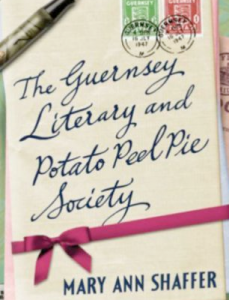
by jphilo | Nov 13, 2008 | Reviews

This week I read a great book. Or to be more accurate, I listened to a great book, The Guernsey Literary and Potato Peel Society by Mary Ann Shaffer and Annie Barrows. The book is written as a series of letters to and from main character, Juliet Ashton. The audio version enhances this format, as the different correspondents’ letters are read by different actors.
The story begins in post-WWII England and moves to the Isle of Guernsey, one of the British channel islands occupied by the Germans during the war. The story of the Literary Society and the German occupation are told through the eyes of the Juliet’s various pen pals. The horrors of the era aren’t glossed over, but the characters responses are real, honest, and ultimately hopeful.
The story is a perfect mix of history, humor, authentic characters and romance. One of Juliet’s quotes ear the end of the book made my ears perk up. In a letter to her editor she says, “This obsession with dignity can ruin your life if you let it.” I need to memorize those words and repeat them whenever my dignity obsession rears it’s ugly little head.
The book isn’t a not a hard read. It’s well-written and the authors bring history alive. You’ll be entertained while you learn about the little-known occupation of English soil during the war. And when you’re finished, you’ll feel good, too. What more could you ask for?
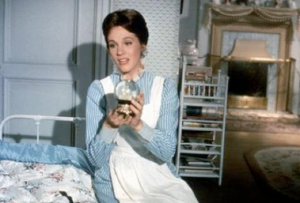
by jphilo | Oct 21, 2008 | Reviews

For the past few days, I’ve been listening to Home, Julie Andrew’s memoir of her early years. She grew up in England during the 1030s and 40s. She spent most of World War II in London and tells fascinating stories of black outs, bomb shelters and the Blitz. Her parents were show biz people, and her stories of life in vaudville are delightful.
But best of all is the narrator, Julie Andrews herself. Her speaking voice is as musical as her singing voice, expressive and perfectly paced, infused with optimism and hope even when she tells of the pain experienced during her parents’ divorce.
Listening to Home is like having Mary Poppins or Maria von Trapp read you a bedtime story. You don’t want to miss it.
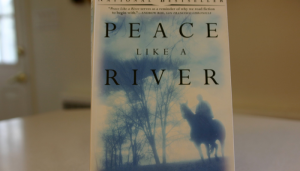
by jphilo | Apr 9, 2008 | Reviews

The email my sister sent yesterday made my day. Leif Enger, author of Peace Like a River, has released a second novel. Since I’ve read Peace Like a River twice and am also a writer, Leif and I are on a first name basis. He just doesn’t know it yet.
Anyway, Leif is my favorite author at present. A few weeks ago, tired of waiting for him to write another book, I reread his first one. I wanted to see how the book had so captured me when I read it a couple years ago. As I read, I underlined words that spoke to my emotions or described places and events so vividly I could picture them.
But by the end of the book, and lots of pencil lead later, I still couldn’t identify what it was. Maybe the setting drew me in – southern Minnesota, Iowa and the western Dakotas – all regions of the United States where I have lived. Maybe the plot about a victimized family led by their father Jeremiah Land, a man of deep faith who treated everyone, even his enemies with Christlike compassion.
I puzzled over it for a few days until I figured it out. I loved Jeremiah’s youngest two kids. Reuben, the narrator of the story, was an eleven-year-old severely asthmatic boy. His younger sister Swede, was a precocious child who wrote reams of cowboy poetry. The events of the story are told through Rube’s eyes and Swede’s poetry by an author who remembers what it was like to be a kid. And that’s why I love this book. Leif understands how kids perceive life and articulated their point of view as few authors can.
According to the reviews of his new novel, So Brave, Young and Handsome, it also has Minnesota roots and a smattering of western poetry. But it doesn’t have Rube and Swede. They grew on me, and I’m going to miss them, no matter how good Leif’s second book is. I hate allowing new people into my life and then watching them leave.
Maybe I’ll read Peace Like a River again, to say good-bye to Rube and Swede. Then I’ll be in the right frame of mind to meet the characters in So Brave, Young and Handsome. I hope a few of them are kids who will enrich my life and then break my heart when we say good-bye.
I love that kind of book.







